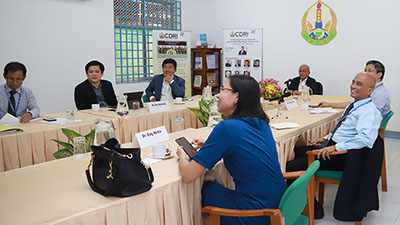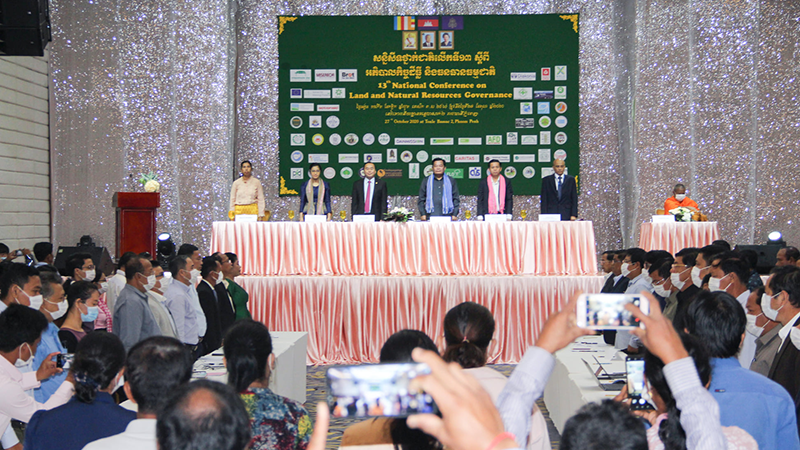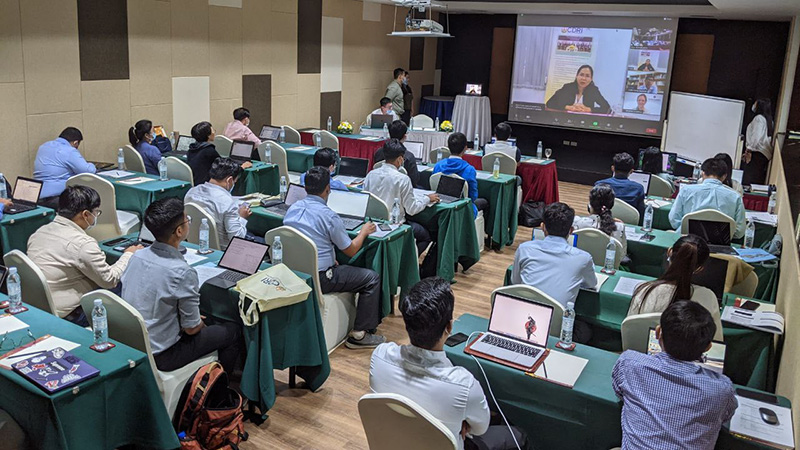
News
03 December 2024Unlocking the Potential of the GMS
Unlocking the Potential of the GMS
By Han Krisna, Winner of the Writing Contest for the 2nd CDRI Regional Symposium 2024 on Digital and Green Economy in the Greater Mekong Subregion: Governance and Gender Inclusion
Good governance is key to inclusive growth, reducing inequality, and ensuring sustainability. In the GMS, weak governance impedes progress in economic development, gender equality, and environmental protection. By promoting transparent policies, supporting SMEs, advancing gender inclusion, and adopting green technologies, the region can achieve sustainable and equitable development.
Growing up in Phnom Penh, I was always intrigued by the success stories of nations like Singapore and Japan. Both countries, like Cambodia, started from humble beginnings and endured hardships, including wars that left marks on their societies. These shared experiences sparked my interest in how effective governance can transform a nation. Reflecting on these nations' governance models, I understood how good governance impacts the political economy, promotes gender inclusion, and fosters advancements in green technology. In the Greater Mekong Subregion (GMS), this understanding is vital for developing resilient, sustainable societies.
This essay will explore how effective governance can improve these areas in the GMS region. Good governance is often viewed as an invisible force driving development, but its tangible effects are seen in growing economies, such as Singapore, Japan, and beyond. With governance as a key pillar, nations can address inequality and environmental degradation, and foster inclusive growth, leading to a better quality of life for citizens.
In the GMS region, several nations face critical issues tied to governance. Weak governance systems often lead to inequality, with large gaps between the rich and poor, limited access to essential services, and environmental degradation. Despite improvements, the region still grapples with issues of corruption, lack of transparency, and slow implementation of policies. This is particularly evident in the political economy, where key markets and industries often become concentrated in the hands of a few powerful players, leaving much of the population struggling to access opportunities.
For instance, in countries like Cambodia, Laos, and Myanmar, corruption and the limited enforcement of policies hinder fair competition, affecting the economic development of the region. The benefits of economic growth are often not distributed equally, with rural areas suffering from inadequate access to basic services like healthcare, education, and infrastructure. This inequality stifles potential and limits economic opportunities for many citizens.
Gender inclusion is another area where poor governance is evident. While countries in the GMS have made strides toward improving women's rights, ingrained cultural norms and insufficient legal protection persists. Gender roles often limit women's access to education and employment, and many still face violence or discrimination. While progress has been made, there is still a lot of work to be done to fix gender inequality.
Lastly, environmental issues urgently need to be addressed in the GMS region. Rapid industrial growth and weak governance have led to pollution, deforestation, and loss of biodiversity. The overuse of resources, like hydropower and sand mining in the Mekong River, are damaging ecosystems and threatening livelihoods. Communities face fluctuating water levels and declining fish catches, while economic growth is at risk. Without clear policies on sustainable development, it is difficult for countries to adopt greener practices, leaving both people and the environment vulnerable.
Good governance is the solution. It means transparent decision-making, accountability, and citizens' active involvement in shaping policies. It creates an environment where opportunities are available to everyone, not just the elite. By strengthening democratic institutions and enforcing laws promoting fairness and sustainability, governments in the GMS can unlock the full potential of their citizens and economies.
Good governance strengthens the political economy by creating a level playing field for businesses and policies that support small and medium enterprises (SMEs). Transparency in government spending, anti-corruption measures, and fair regulations can attract investment, particularly in manufacturing, services, and agriculture, where much of the GMS economy is concentrated. Governments in the GMS can look at model nations, such as Singapore, which has built a thriving economy with a transparent, corruption-free environment, strong infrastructure, and open competition.
Good governance impacts gender inclusion by passing laws ensuring equal pay, safe working conditions, and access to education. Affirmative action policies, such as quotas for women in political offices, can accelerate progress.
Japan’s “Womenomics” initiative has shown how government action can break cultural barriers. In the GMS, policies supporting women-owned businesses, workplace rights, and gender-sensitive education can build a society where both men and women contribute equally to the economy.
Governments should create more incentives for businesses to adopt sustainable practices, such as subsidies, tax breaks, and research funding for green innovations. The GMS can learn from Japan, a leader in green technology from renewable energy investment to energy ehttps://www.jstor.org/stable/41854775ficiency.
Countries like Laos and Cambodia can promote renewable energy like hydropower and solar power to reduce dependence on coal and oil. Green technologies help mitigate environmental damage and open new growth avenues in rural areas.
Building strong governance takes time, and resistance from the powerful elite is common. Implementing gender or green technology policies requires substantial investment, which poorer GMS nations may struggle to afford without external aid.
However, the benefits of investing in good governance far outweigh the challenges. Countries like Singapore and Japan demonstrate that effective governance can yield economic, social, and environmental benefits even with limited resources and geographical challenges.
In conclusion, good governance is essential for the GMS region to thrive. By focusing on transparent decision making, accountability, and citizen participation, governments can create fair opportunities for everyone, not just the elite. Strengthening democratic institutions, enforcing fair laws, and fostering sustainability can unlock the potential.
Governance is the key to improving the political economy by encouraging fair competition and supporting small businesses. It can also promote gender inclusion by ensuring equal pay, better working conditions, and access to education. Additionally, embracing green technology will help protect the environment and create new opportunities for growth.
While building strong governance systems may be difficult and require investment, the benefits are worthwhile. Countries like Singapore and Japan prove that even with limited resources, effective governance can bring lasting social, economic, and environmental progress. The time to act is now, and the path to a better future begins with governance that puts people first.
Disclaimer: The views expressed in this essay are those of the writer and do not necessarily reflect the views of the Cambodia Development Resource Institute (CDRI). The writer is responsible for any unintentional errors or mistakes.



